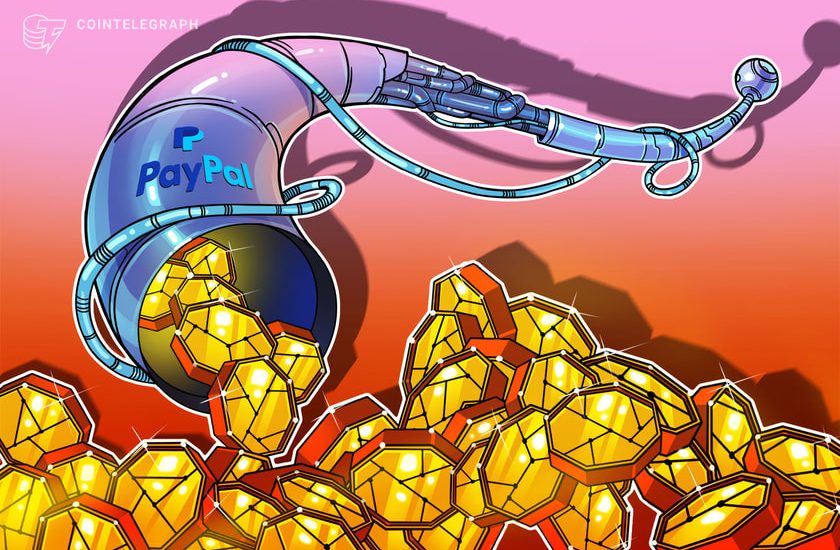- August 11, 2023
- Posted by: admin
- Category: BitCoin, Blockchain, Cryptocurrency, Investments


This week’s Crypto Biz explores PayPal’s stablecoin, Coinbase’s new layer 2 network, Bitstamp’s fundraising and the growing popularity of crypto bots on Telegram.
In a move that can reshape the digital payments landscape, financial technology giant PayPal has unveiled its United States dollar-pegged stablecoin PayPal USD (PYUSD).
In line with expectations, the launch has ignited a complex debate within the crypto community.
Ethereum’s daily active user base hovers between 300,000 to 400,000, which is a fraction of PayPal’s colossal user base count of over 430 million. As a result, some see the move as a significant step toward transforming Ethereum into the internet’s monetary backbone. Despite the excitement, skepticism looms over the crypto landscape, with questions about crypto centralization taking center stage.
However, concerns raised by the crypto community may not pose the biggest challenge to PayPal’s stablecoin; the regulatory landscape is still uncertain in the U.S., where the fintech company is headquartered.
PayPal is said to have been discussing the stablecoin with regulators and lawmakers in recent months, lobbying for clarity from authorities before releasing PYUSD. Democratic and Republican House Financial Services Committee members have voiced contrasting opinions on the stablecoin launch.
Nevertheless, the PYUSD debut shows PayPal’s optimism about an upcoming framework for stablecoins oversight in the United States. As regulatory debates unfold, PYUSD’s impact on the industry’s evolution and stablecoin dominance remains to be seen.
This week’s Crypto Biz explores PayPal’s stablecoin, Coinbase’s new layer 2 network, Bitstamp’s fundraising and the growing popularity of crypto bots on Telegram.
PayPal launches PYUSD stablecoin for payment
American financial technology company PayPal launched a new stablecoin on Aug. 7. The U.S. dollar-pegged PYUSD will be issued by Paxos Trust Company, and it is fully backed by U.S. dollar deposits, short-term Treasurys and similar cash equivalents. PYUSD is built on Ethereum and is “designed for digital payments and Web3.” The stablecoin is expected to be available in the U.S. soon, according to the firm. To justify the move, PayPal argues that the regulatory environment around stablecoins in the U.S. is gradually “progressing toward more clarity,” thus, there is a demand for alternative stablecoins. The company first confirmed its plans to launch a stablecoin in January 2022, claiming it would work closely with relevant regulators. The stablecoin will be redeemable for U.S. dollars or exchanged for other cryptocurrencies on the platform.
Bitstamp crypto exchange to raise funds for global expansion
Bitstamp is moving forward with its global expansion ambitions, working to raise new funds to scale operations worldwide, including plans to launch derivatives trading in Europe in 2024 and expand its services in Asia and the United Kingdom. Bitstamp currently operates in 194 countries. In the U.S., the company announced that the trading of several tokens deemed securities by the Securities and Exchange Commission would be suspended soon. This includes Axie Infinity (AXS), Chiliz (CHZ), Decentraland (MANA), Polygon (MATIC), Near (NEAR), The Sandbox (SAND) and Solana (SOL). These developments follow Ripple’s acquisition of a minority stake in Bitstamp in the first quarter of 2023.
Base network has officially launched: Here’s how it can be used
Coinbase’s layer-2 network, Base, was launched on Aug. 9, allowing end users to onboard for the first time without relying on developer tools. In response to the launch, several Web3 teams announced the release of apps running on Base. A few things users can do on Base right now include bridging Ether (ETH) from mainnet to Base, swapping tokens and providing liquidity through decentralized exchanges, making payments, registering a username, launching a decentralized autonomous organization and minting nonfungible tokens. In another headline, Coinbase will start buying back up to $150 million of its 2031 senior notes for $0.645 — a discount of 35.5%. The 2031 senior notes have a coupon rate of 3.625% yearly and a total principal balance of $1 billion. The tender offer will last until Sept. 1.
Base is open and Onchain Summer is here
Become a part of Base history by minting “Base Day One” to join the story of bringing the world onchain
Our story.https://t.co/qaDj7CBCMd pic.twitter.com/9PZCLQQV7p
— Base ️ (@BuildOnBase) August 9, 2023
Telegram crypto bots gain momentum in the market: Binance Research
Telegram bots have been increasingly emerging as a new tool to get exposure to cryptocurrency markets and several related services. The cumulative crypto trading volume associated with Telegram bots exceeded $190 million as of early August 2023, according to a new report by Binance Research. Crypto activity facilitated through these bots has increased in recent months. On July 23, daily volumes of trades hit a record high of $10 million. Telegram bots are often connected to peer-to-peer or decentralized cryptocurrency exchanges, enabling users to execute trades using chatbot commands. Telegram bots have collected more than 15,500 ETH (about $28 million) in all-time revenue, Binance reported.
Crypto Biz is your weekly pulse of the business behind blockchain and crypto, delivered directly to your inbox every Thursday.
